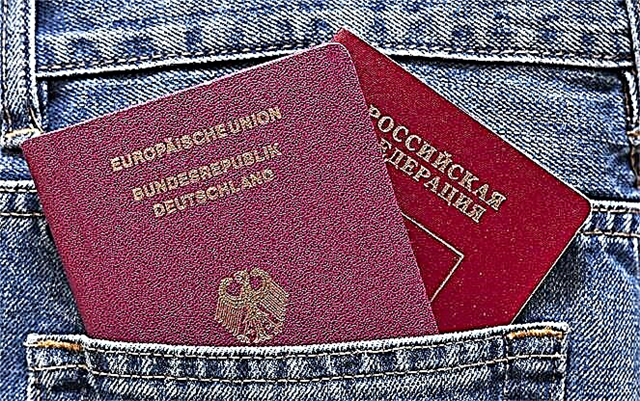Germany, despite its ambiguous history, has always remained one of the most comfortable and therefore preferred countries to live in. As one of the most developed countries on the planet, it annually becomes a haven for hundreds of thousands of newly minted Germans, including many former Russians. In this context, many of our compatriots are increasingly worried about dual citizenship in Germany with Russia. Is it possible under the laws of both countries, and if so, in what cases?
What is dual and multiple citizenship
Bipatrism and multiple citizenship arose back in the days of Roman law: according to it, this is the legal status of a person who has citizenship to several countries at once, which, in turn, consider him to be their citizen. Plurality should be distinguished from dual citizenship, which can arise only as a result of the conclusion between countries of an appropriate international treaty on mutual recognition.
Such treaties, as a rule, are concluded only by countries between which there are historical ties created for centuries, therefore they are a rarity in international practice. Among the most famous examples are treaties between Great Britain and the countries of the British Commonwealth, between Italy and Argentina, and so on.
If there are no such agreements, each of the countries in relations with a bipatride recognizes him exclusively as its own citizen, not recognizing his second passport on its territory. But if bipatrism is allowed by the legislation of the country, non-recognition does not deprive a citizen of the right to own two passports.
Bipatrism: Germany's position
Now we propose to find out whether a German citizen can have dual citizenship. The basis of local legislation on citizenship is the German Citizenship Law - Staatsangehörigkeitsgesetz - adopted on July 22, 1913 in the German Empire and still in force, albeit with amendments (hereinafter - the Law).
The position of the state with regard to bipatrism is set forth in paragraph 25 of the said law, according to which every German loses his German citizenship if he receives a passport of any other country at his own will or at the will of his legal representative.
A similar rule has been established with respect to foreigners who apply for German citizenship: according to paragraph 10 of the law, the issuance of a German passport is possible only in case of loss of the previous citizenship or refusal from it.
Thus, German law, as a general rule, denies the possibility of obtaining both dual and multiple citizenship. For a long time, such standards were considered the only correct ones. However, the change in the migration situation forced the German leadership to reconsider its position.
Even before the European migration crisis, namely from the mid-90s, the country's migration policy began to change: there were some exceptions regarding the possession of both foreign and German passports, citizenship was granted by birthright, and a number of other changes were also made.
Some German political forces still continue to insist on a tougher migration policy, however, German bipatrism, although in exceptional cases, still exists. We propose to consider these exceptions in more detail.
When dual and multiple citizenship is possible
According to the German Bureau of Statistics, about 4.5 million bipatrides live in Germany. Germans with foreign citizenship have, first of all, passports of Turkey, Poland and, oddly enough, Russia. How did they get around the legal ban on dual citizenship?
 The fact is that it is possible to legally obtain a second citizenship in Germany and, accordingly, to circumvent the prohibition, it is possible only when referring to exceptional cases, which, according to paragraph 25 of the German Citizenship Law, are:
The fact is that it is possible to legally obtain a second citizenship in Germany and, accordingly, to circumvent the prohibition, it is possible only when referring to exceptional cases, which, according to paragraph 25 of the German Citizenship Law, are:
- the second citizenship of a German arises automatically, without filing an application: for example, when marrying a foreigner, whose citizenship, according to the law of a foreign state, automatically extends to his spouse;
- a German acquires a passport from Switzerland, another country that is a member of the European Union, or a country with which Germany has a corresponding international agreement - in this case, it is even possible to make dual citizenship, if this is provided for by the relevant contractual framework;
- the German received the appropriate permission from the competent authorities to retain the German passport - this is possible, in particular, if multiple citizenship is provided for by the German Residence Act (Aufenthaltsgesetz). If a German at that moment does not live in Germany, the law requires that the German consul in his country of residence express his position on this matter.
In addition, paragraph 12 of the German Citizenship Act provides for a number of exceptions when acquiring a German passport does not require renunciation of foreign citizenship. So, newly minted German citizens can keep their past foreign passport if:
- the legislation of the country of the second nationality of the person does not provide for or makes impossible the procedure for renouncing citizenship;
- the procedure for renouncing citizenship has been delayed or is inconveniently expensive;
- the foreign state, even despite the observance of all procedural points, refuses the applicant to renounce citizenship;
- elderly people undergo naturalization - they are also allowed to retain their previous citizenship;
- renunciation of citizenship, in addition to the loss of a passport, will entail significant infringements of the citizen in terms of economic and property rights (for example, the loss of a pension, which is the only means of subsistence).
All these persons are entitled to keep both foreign and German passports. In addition to them, in accordance with paragraph 29 of the above law, the right to bipatrism is guaranteed to children born in Germany if at least one of the parents was German and the other was a foreigner.
Previously, such dual citizenship was valid until the bipatride reached 23 years old, after which the law obliged him to make a choice between two passports. If the refusal of the foreign document was impossible or unreasonable, the legislator allowed the preservation of dual citizenship. However, the amendments to the legislation adopted in 2021 make it possible to maintain bipatrism even after 23 years.
But it will not be possible to automatically acquire dual citizenship after marriage with a German. Marital relations with a German citizen, of course, provide foreigners with some privileges in terms of obtaining a German passport, however, paragraph 9 of the Act, as a prerequisite for naturalization of spouses of Germans, also establishes the refusal of their foreign passport.
Thus, we can draw an intermediate conclusion: in general cases, bipatrism is prohibited in Germany, however, in some cases, exceptions are possible, allowing one to obtain both multiple and dual citizenship. And what do they think about this in Russia?
Bipatrism in RF
 In Russia, it is easier with bipatrism: the right to obtain a foreign passport is enshrined in Art. 62 of the Constitution of Russia, according to which a new citizenship does not deprive a Russian of the rights and obligations assigned to him by a Russian passport. A clarification on this matter is set out in Art.6 Federal Law No. 62 of May 31, 2002: in civil relations between Russia and a bipatride holding Russian citizenship, he is recognized exclusively as a citizen of Russia.
In Russia, it is easier with bipatrism: the right to obtain a foreign passport is enshrined in Art. 62 of the Constitution of Russia, according to which a new citizenship does not deprive a Russian of the rights and obligations assigned to him by a Russian passport. A clarification on this matter is set out in Art.6 Federal Law No. 62 of May 31, 2002: in civil relations between Russia and a bipatride holding Russian citizenship, he is recognized exclusively as a citizen of Russia.
Exceptions are possible only when Russia has a corresponding contractual basis with another country - in this case, the holder of two passports can be recognized in the Russian Federation as a bipatride.
The only such agreement was concluded between the Russian Federation and Tajikistan. No such agreement was concluded with Germany, and therefore Russian-German dual citizenship in 2021 is impossible even in theory. Moreover, given the fact that German law in most cases prohibits bipatrism, it is impossible to obtain a German passport without going through the citizenship change procedure. Let's briefly consider it.
Change of citizenship
To acquire German citizenship, you must initially renounce Russian citizenship. Withdrawal from it is carried out in accordance with Articles 19-20 of the Federal Law No. 62 dated May 31, 2002. It is possible as a result of a voluntary expression of the will of a Russian, provided that:
- he has no outstanding obligations to the Russian Federation: for the payment of taxes, for the passage of military service;
- he is not under criminal prosecution;
- he acquires another civic identity or guarantees of its receipt after the severing of ties with the Russian Federation.
Only then will the former Russian be able to acquire a German passport. Most often this happens through naturalization, the main conditions of which include:
- legal residence in the country for 8 years (the period can be reduced to 7 or 6 years);
- observance of the Constitution and laws;
- acquisition of the right to permanent residence;
- the opportunity to earn money without claims for social benefits;
- lack of court verdicts against the candidate;
- sufficient knowledge of the language, legal and social order of the FRG.
The article "Renunciation of Russian Citizenship" will tell you more about the procedural issues.
Conclusion
The obvious conclusion: neither dual nor multiple Russian-German citizenship can be formalized in a general manner. Firstly, there is no corresponding legal framework between the countries, and secondly, this is expressly prohibited by German law.
Russians wishing to obtain a German passport will have to renounce their Russian citizenship. However, German laws provide for some exceptions: for example, retaining a Russian passport is possible when elderly Russians are naturalized in Germany or for a child born, one of whose parents is Russian and the other is German.











